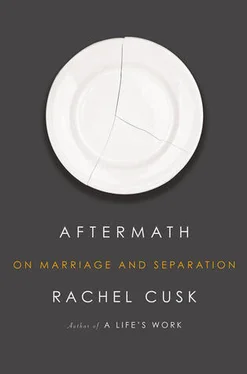Rachel Cusk - Aftermath - On Marriage and Separation
Здесь есть возможность читать онлайн «Rachel Cusk - Aftermath - On Marriage and Separation» весь текст электронной книги совершенно бесплатно (целиком полную версию без сокращений). В некоторых случаях можно слушать аудио, скачать через торрент в формате fb2 и присутствует краткое содержание. Год выпуска: 2012, Издательство: Farrar, Straus and Giroux, Жанр: Публицистика, Биографии и Мемуары, на английском языке. Описание произведения, (предисловие) а так же отзывы посетителей доступны на портале библиотеки ЛибКат.
- Название:Aftermath: On Marriage and Separation
- Автор:
- Издательство:Farrar, Straus and Giroux
- Жанр:
- Год:2012
- ISBN:нет данных
- Рейтинг книги:3 / 5. Голосов: 1
-
Избранное:Добавить в избранное
- Отзывы:
-
Ваша оценка:
- 60
- 1
- 2
- 3
- 4
- 5
Aftermath: On Marriage and Separation: краткое содержание, описание и аннотация
Предлагаем к чтению аннотацию, описание, краткое содержание или предисловие (зависит от того, что написал сам автор книги «Aftermath: On Marriage and Separation»). Если вы не нашли необходимую информацию о книге — напишите в комментариях, мы постараемся отыскать её.
Aftermath: On Marriage and Separation — читать онлайн бесплатно полную книгу (весь текст) целиком
Ниже представлен текст книги, разбитый по страницам. Система сохранения места последней прочитанной страницы, позволяет с удобством читать онлайн бесплатно книгу «Aftermath: On Marriage and Separation», без необходимости каждый раз заново искать на чём Вы остановились. Поставьте закладку, и сможете в любой момент перейти на страницу, на которой закончили чтение.
Интервал:
Закладка:
Clytemnestra has had no choice but to live and rule without her husband all these years; a working mother, if you will, single parent to her son Orestes and her daughter Electra. There was another daughter, Iphegenia, the eldest, who is dead. Her absence haunts this drama, this family, for in a way a family and a drama are the same thing. Iphegenia died at the very time her father Agamemnon set sail for Troy: the two events are inseparably linked. On that day, Agamemnon and his fleet, all prepared for war, found themselves becalmed in the harbour and unable to depart. There was no wind to fill the sails: the driving force of civilisation, the whole thrusting work of men caught up in the furtherance of their aims, was brought to a standstill by a simple withdrawal of the favourable conditions. They had forgotten that they depended on this favour, this willingness of the wind. They had forgotten to propitiate Artemis, the goddess whose wind it was, as men forget at their peril to propitiate the women on whose willingness their plans and projects depend, for though women don’t fight wars or build civilisation, all is conditional on their willingness for it to be done. Were women not willing, civilisation would be halted. There the men sat in the harbour, armed to the teeth, with no means of getting where they wanted to go. What could they give Artemis to bring her round? How could they mollify her, fast, in order to get going? An extravagant gift was the answer. She liked sacrifices, the blood of virgins, a valuable girl laid on her altar like a cultured pearl. Agamemnon’s daughter Iphegenia, a virgin, a princess, and what’s more dearly loved by her parents, would make a rare present. Especially the love: the goddess would appreciate that, like the special lustre on the pearl of great price. All night Agamemnon agonised, but as Clytemnestra bitterly noted, what he decided came as no surprise. And what is it, the agony of decision where the decision is already made? Had Agamemnon not agonised, Iphegenia’s value would have been diminished. Had he offered her up easily, the goddess might not have been satisfied. The agony was a kind of formality, but it was a perversion too, a misuse of emotion. The next day Iphegenia was led out in the saffron-coloured dress that was meant for her wedding, and lying bound on the stone altar she watched while her father raised a knife and drove it into her heart.
Rupert tells me that his girlfriend, once so clinging and dependent, has found a new lease of life in their separation. She has moved up to London; she is out every night, at bars and clubs and parties. He claims to be relieved: he was the one who brought their relationship to an end, and was prepared to do a certain amount of penance for it. He had expected long, tearful telephone calls, flashes of anger and accusation, pleas for reconciliation. But instead, when he speaks to her — which is rarely — she claims to feel liberated. He’s worried, though; after all, he knows her well. She’s a woman whose sorrows take extrovert and hedonistic forms. Yet the fact is she doesn’t seem to need him, doesn’t call.
Every day he leaves the house early, at half past six, vanished into the pale light of morning amid the seagulls’ cacophonous waking cries. He retires early too, at half past nine. Sometimes I glimpse his male form in the dusky stairwell, clad in a white towelling robe. In the kitchen his ready meals revolve in the planetary light of the microwave oven. He eats on a stool at the counter, turning the pages of a newspaper. Once a month he has a Saturday off and takes his mother out to lunch: she lives not far away. Rupert is her only child; his father left when he was a baby and started a new family elsewhere. His second wife is rich and powerful where Rupert’s mother is fragile and impoverished. He hasn’t seen his father for years. The two of them have moved around the country, drifting like dandelion seeds troubled by breezes, too light and bewildered to find the earth. For a while Rupert attended a choir school. Despite the insubstantiality of his origins, he was discovered to have a strong voice. The school was an upper-class institution: Rupert was given a scholarship. When he speaks of that time he wears a child’s costive expression on his face. The choristers would sing in their white robes from the top of the bell tower. One day one of Rupert’s schoolfellows climbed the tower and jumped off it. I ask whether he still sings and he screws up his mouth in reply.
Agamemnon hesitates before treading the tapestries underfoot and entering the palace, just as Adam hesitated before taking the red apple Eve held out to him. Woman, it seems, does not suffer these qualms. She is not afraid, or else she is in the grip of something stronger than fear, stronger than obedience. Clytemnestra persuades Agamemnon, as Eve persuaded Adam. She alludes to the splendour and beauty of the tapestries, their costliness, his might in walking over them; Agamemnon is torn, torn between obedience to the gods and the desire to submit to his wife. It is as though, for a man, a woman represents the possibility of doing without God. She is a force of pure mortality, in whom the darkest and richest possibilities for living can be realised. Who are her gods? Whose authority, in the end, does she herself recognise?
He walks in, walks over the tapestries. He treads their beauty underfoot and she kills him. What does it signify, her need to get him inside? In a marriage, inside is where intimacy happens, where couples fight or make love, where they’re honest, where they’re their ‘real’ selves. Most marriages have a public face, an aspect of performance, like the body has its skin. A couple arguing in public is like the body bleeding, but there are other forms of death that aren’t apparent on the outside. People are shocked by cancer, so noiseless and invisible, and by the break-up of couples whose hostility to one another never showed. They seemed so happy, people say, for the idea that death might give no sign of its coming leads us to suspect it is already here. You were the last people, a close friend said to me, the last people we expected this to happen to. And this friend, like some others, went away, just as people run away from plague victims in their agony, for fear that it might be catching. Sometimes the phone rings in my half-empty house and a woman’s voice says, we’re so sorry. We were so sorry to hear.
Clytemnestra, in her husband’s ten-year absence, has become intimate with Aegysthus. He is not, of course, the father of her children. He is not her husband, for her husband still lives. She is queen of Argos but Aegysthus cannot be king alongside her, for the king — her husband, Agamemnon — still lives. There is no space for Aegysthus, no throne, no room. If Agamemnon were dead a space would be created: the fatherless children, the husbandless wife, the country with no king, these would be vacuums that needed filling to keep the enterprise of life afloat. But as it stands, despite Clytemnestra’s will, nothing about Aegysthus meets with a fair wind. His authority is rejected everywhere: the children resent him, the people refuse to recognise him, the country is viewed as being in a terrible plight. In marriage Clytemnestra found the force of life came up effortless and strong; children were born, power accrued, ambitions took root and flourished, but most of all there was belief, belief in the rightness and reality of it all. It is interesting what people will forgive, what they will tolerate, when they believe. When they doubt they will tolerate nothing, and Aegysthus is doubted by everyone except the woman Clytemnestra.
In Agamemnon’s absence Clytemnestra has had to play his role: she has learned that she is capable of governing his palace, of ruling Argos, of commanding his underlings. So the mystery of his masculinity has been, to an extent, unveiled; the form of male and female has been tested and found to be limitation and lie. This new relationship with Aegysthus has been chosen by the new unisexual Clytemnestra. She is seeking a new form, a new configuration of female and male. She is seeking equality. Children will not be born from equality, nor will empires be built or frontiers expanded, for the pure peace of equality begets nothing. It is all aftermath, predicated on the death of what was before. To beget requires the domination of one thing by the other, the domination of female form by male content; then, in order to nurture what has been begotten, the reverse. Clytemnestra wants no more begetting. She wants the peace of equality but to get it she will have to use violence. To reach aftermath, first there has to be the event itself.
Читать дальшеИнтервал:
Закладка:
Похожие книги на «Aftermath: On Marriage and Separation»
Представляем Вашему вниманию похожие книги на «Aftermath: On Marriage and Separation» списком для выбора. Мы отобрали схожую по названию и смыслу литературу в надежде предоставить читателям больше вариантов отыскать новые, интересные, ещё непрочитанные произведения.
Обсуждение, отзывы о книге «Aftermath: On Marriage and Separation» и просто собственные мнения читателей. Оставьте ваши комментарии, напишите, что Вы думаете о произведении, его смысле или главных героях. Укажите что конкретно понравилось, а что нет, и почему Вы так считаете.












